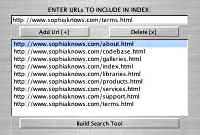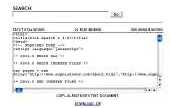Site Search v 2.0 Javascript Toolmaker
The SSv2.0 JS Toolmaker compiles a fully portable, custom search application providing full-text keyword search of your site and site contents.
The application search box and Javascript search code generated by the Toolmaker can be cut-n-pasted into your exisiting site pages to provide your visitors with a convenient automated search of site and site pages.
The Toolmaker application can be configured by anyone familiar with basic html markup and can be run from any web accessible server (and even on your desktop).
Sumbmitting URL List
To compile a search tool, you need to begin by telling the Toolmaker which pages to include in the index and where they can be found.
There are two ways to enter the list of page locations: the Combo-box and the Paste Box

Combo-box: To add a page, enter or paste its full url into the top combo-box input. Select [Add Url] to add the url to the scrollable list.
To delete a page previously added to the list, select its url in the scrollable menu and select [Delete]
Paste Box: User can also compile their list of pages in text document (with each url on a separate line) and simply copy-n-paste the full list into the Paste Box input.
Once you have entered or pasted the page list into the appropriate form, select [Build Search Tool].

The SSv2.0 JS Toolmaker will open a new window including:
(1) A fully functioning demonstration search tool;
(2) a textarea input containing the cut-n-paste source code for the application; and
(3) a link to a .Zip file archive including the custom application components.
Sample Search Tool
To run a demo search of the custom site index, enter one or more search terms into the search input and select [Go]
A relevancy ranked list of matched pages will open in a search window.
Cut-n-Paste Code:
The cut-n-paste code in the textarea comprises an HTML template including both the search form and custom Javascript source code.
To capture the cut-n-paste code, select within the textarea, highlight all textarea contents [control-a] copy [control-c] to your clipboard.
Open a new text document (Notepad, TextEdit, BBEdit et al.) and paste [control-v] the contents of the clipboard into the document.
Save [control-s] the document with the suffix .htm/html
Open the template in your browser, enter one or more search words in the searchbox form and click [Go].
Zipped Code
To download the compontents of the application in separate files, select the [Download .Zip] link below the text-area. An archive will be downloaded to your local disk containing:
- ss2.js a Javascript source file including the custome index and search routines.
- search.html a sample HTML search form to be included in your pages.
- toolmaker.html a local copy of the combo-box form for updating your site index.
- readme.txt a text help file including release notes and configuration instructions.
To add the search code to your existing site pages: Add the following tag to the head of each page that will include the search form:
<script src="ssv20.js"></script>
To add the search box to your existing site pages: Copy the code indicated by the comments in search.html and paste and format the form to suit your tastes and the surrounding page.
Additional configuration notes can be found in readme.txt included in the archive.
Bugs-A-Poppin
MSIE 5 imposes an unknown upward ceiling on the number of data rows that can be displayed in a form textarea. As a result, the code for page indices including more than n unique words may be truncated by the browser.
The zipped archive in these instances, however, remain uneffected by the bug and users can recover the intact code from this source.
About SSv2.0 JS Search Routines
The SSv2.0 JS search routines perform relevancy weighted keyword search. The application can search for and score the occurrences of one or more words entered into the search form.
Searches are conjunctive. That is: if a single word is submitted, the routines return a list of all documents containing that word.
If two or more words are submitted, the routines return a list of all documents containing all of the words (but not documents containing only one of the searched words)
The SSv2.0 JS search routines do not provide phrase search.
If the words "big man" are submitted, the search routines will return a list of documents containing both the words "BIG" and "MAN", but the occurrences of each word might be widely separated from the other.